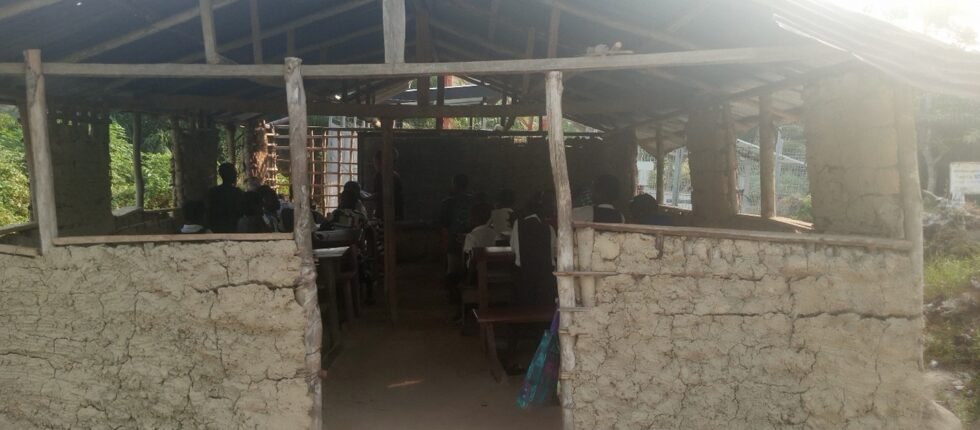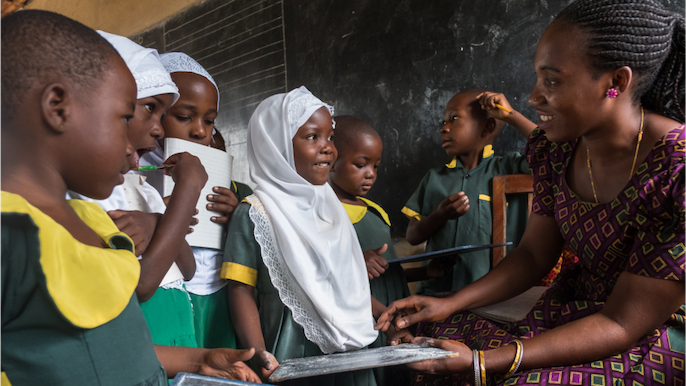The Resources Nook
Discover valuable insights into early childhood data and measurement with our collection of blogs, reports, presentations, articles, and briefs curated by ECD Measure and our esteemed partners.
Newsletter: April 2025 Updates & Insights
Stay informed with our latest newsletter featuring April 2025 updates, insights, and news in early childhood care and education. Explore valuable resources, articles, and announcements to empower your work and stay connected with ECD Measure and our global community.
Briefing: Developing a quality assurance system for daycare centres in Tanzania
ECD Measure supported the Tanzanian government in piloting a quality assurance system (QAS) for community-based daycare centres serving children aged 2–4. Read more in our brief.
Newsletter: January 2025 Updates & Insights
Stay informed with our latest newsletter featuring January 2025 updates, insights, and news in early childhood care and education. Explore valuable resources, articles, and announcements to empower your work and stay connected with ECD Measure and our global community.
ECD Measure's 2024 Year in Review
As we reflect on the year 2024, ECD Measure is proud of our impact to advance quality early childhood education (ECE) globally. Over the past year, we have expanded our footprint, collaborated with new partners, and refined our approaches to using data to drive improvements in early childhood quality. From groundbreaking research to the expansion of our flagship tech-enabled Brief Early Childhood Quality Inventory (BEQI) Together in Practice toolkit, 2024 has been a year of significant progress for our organization.
BEQI: Evidence for Subscales
Using a dataset of more than 800 observations of early childhood settings conducted by trained observers, we assessed the evidence for the modules we use to summarize BEQI results. We were interested in determining whether proposed underlying constructs of play-based learning, learning through conversations, and promoting strong relationships were supported by the data.
Enhancing Early Childhood Education Quality Through Data-Driven Approaches in Guinea-Bissau
In 2024, ECD Measure collaborated with the Guinea-Bissau Ministry of Education and UNICEF to strengthen the country’s Early Childhood Education (ECE) systems through two key initiatives: the development of a Quality Assurance System (QAS) and leveraging BEQI (Brief Early Childhood Quality Inventory) classroom observation data to support ECE educators. These efforts are paving the way for improved ECE quality by integrating data-driven practices and empowering educators with actionable insights.
Newsletter: October 2024 Updates & Insights
Stay informed with our latest monthly newsletter featuring October 2024 updates, insights, and news in early childhood care and education. Explore valuable resources, articles, and announcements to empower your work and stay connected with ECD Measure and our global community.
Virtual Quality Improvement in Early Childhood: Virtual Observations, Goal Setting, and Text Messaging to Promote Adoption of Evidence-based Practices
This published study shows that by providing targeted virtual feedback and support, BEQI Together in Practice can help childcare professionals improve their practices, and in turn, create more positive and engaging learning environments for children.
Government Monitoring of Early Childhood Education Practices in The Gambia, Uganda, and Zambia
This brief is intended to support country-level early childhood stakeholders to communicate the purpose of BEQI, the importance of key evidence-based practices in early childhood care and education, and results from the BEQI pilot in The Gambia, Uganda, and Zambia
Working Towards Building a National Integrated ECD Data Collection and Management System in Liberia
This blog features Dr. Cecelia Cassell, Dean of the William V.S. Tubman Teachers College at the University of Liberia, and chair of the CATALYZE T4ECE Liberia Task Force. Over the next year, the University of Liberia will be leading the T4ECE Liberia Task Force as they work towards developing a standardized and national tool for assessment early learning outcomes and school readiness. Read more as Dr. Cassell reflects on the progresses made and what is to come as Liberia moves forward with its vision to create a national integrated ECD data collection and management system.
Quality and inequality in pre-primary and home environment inputs to early childhood development in Egypt
This paper examines how pre-primary quality, stimulation at home, and early childhood development vary by socioeconomic status for pre-primary students in Egypt. The results demonstrate substantial socioeconomic inequality in stimulation at home, more so than in pre-primary quality and inputs, although there is variation in the degree of inequality across different dimensions of pre-primary quality.
Overview of the BEQI: Together in Practice System
BEQI: Together in Practice is an easy-to-use system designed to help monitor and improve early childhood programs through evidence-based practices. At the core of the system is the Brief Early Childhood Quality Inventory (BEQI), an adaptable, proven tool that is already helping early childhood programs for children from birth to age five in 18 countries monitor environments and practices.
Results Brief - BEQI: Together in Practice Feedback and Goalsetting with Childcare Educators
Use of evidence-based practices in out of home childcare settings can promote healthy development in young children. The goal of our study was to test the use of the BEQI: Together in Practice system in changing behaviors of childcare educators to adopt more evidence-based practices.
The Ripple Effect of BEQI: Monitoring ECCE Quality in Guinea Bissau
In this blog, we hear from colleagues in Guinea Bissau about how using the BEQI has created a ripple effect throughout the entire education system, helping to legitimize ECE within the broader system, and becoming the impetus for creating a data-driven quality ECE system.
Profiles of Quality In Three Distinct Early Childhood Programs Using The Brief Early Childhood Quality Inventory (BEQI)
Drawing on principles of mixed methods design, this study reports on a new approach to ECCE quality measurement: the Brief Early Childhood Quality Inventory. Using data from the USA, Liberia, and Colombia, results indicate variation in the items perceived as highly relevant to each setting and in the characteristics of classrooms including the degree of child autonomy, the types of activities, and in child/educator interactions and dialogue.
A Spotlight on Developing Liberia’s First ECE Program Catalogue
In this blog, we hear from the Liberia T4ECE country task force team about their experience in developing a catalogue of ECE programs and quality indicators and how the data collected will be used to help focus and manage resources to improve the quality of ECE in Liberia.
Taking a Human-Centered Design Approach to Early Childhood Measurement and Data
This blog focuses on our team's work using human-centered design to think about how measurement tools and systems can respond to the needs of early childhood teachers and providers.
Relationship-building practices and social-emotional development in Liberian Preschools: Our findings using the BEQI observation tool
This blog features work in Liberia to adapt and use ECD Measure's Brief Early Childhood Quality Inventory (BEQI) to help Liberian researchers and policymakers understand the current state of preschool quality and make choices about how to improve.
Ten Countries Take a School-driven Approach to Measuring and Improving Preschool Quality
We now know that quality early childhood programs can have a lasting positive impact. But we know less about how to translate that science into workable solutions for programs around the world. While there is increasing interest in measuring the quality of preschool environments, a challenge comes in creating feedback loops where quality data lead to improved teaching and learning processes.
Nebraska Early Childhood Collaborative Partnership to Support Family Child Care Providers
Family child care is extremely important to many families with young children. Often run by independent small business owners, family child care providers balance caring for children with all of the functions of running a small business. To help support these critical early childhood professionals, ECD Measure has partnered with the Nebraska Early Childhood Collaborative (NECC) to use the Brief Early Quality Inventory (BEQI) observation tool and BEQI self-assessment as part of NECC’s new Family Child Care Network initiative to providers in Nebraska.



















